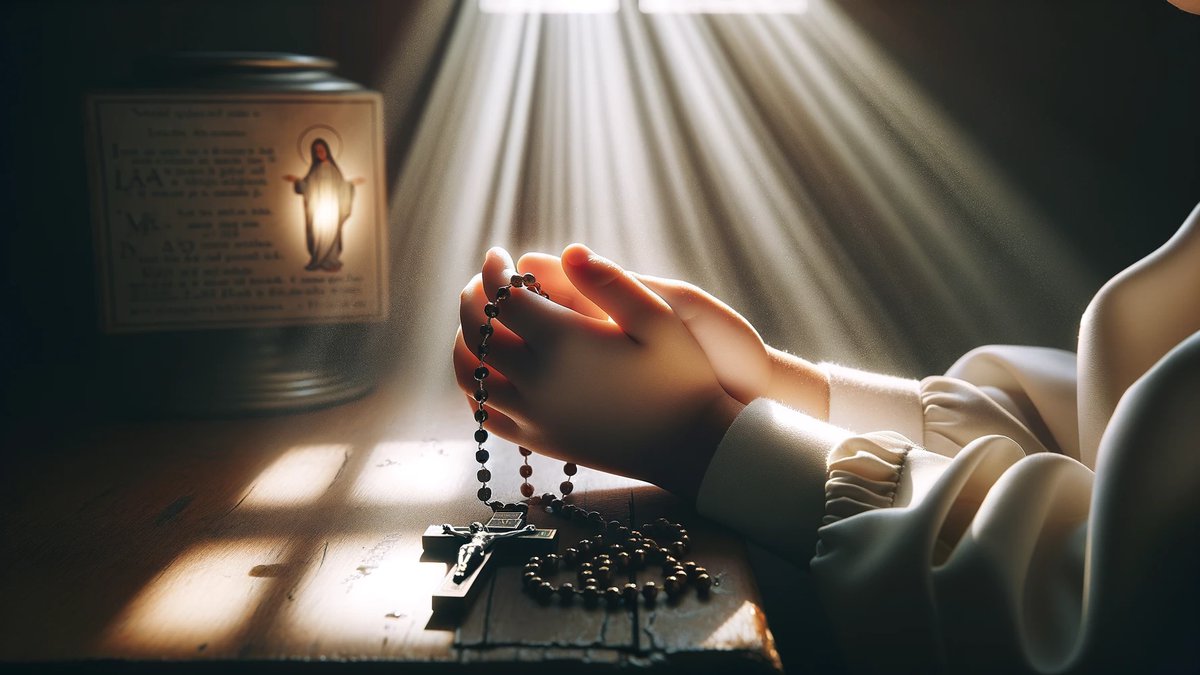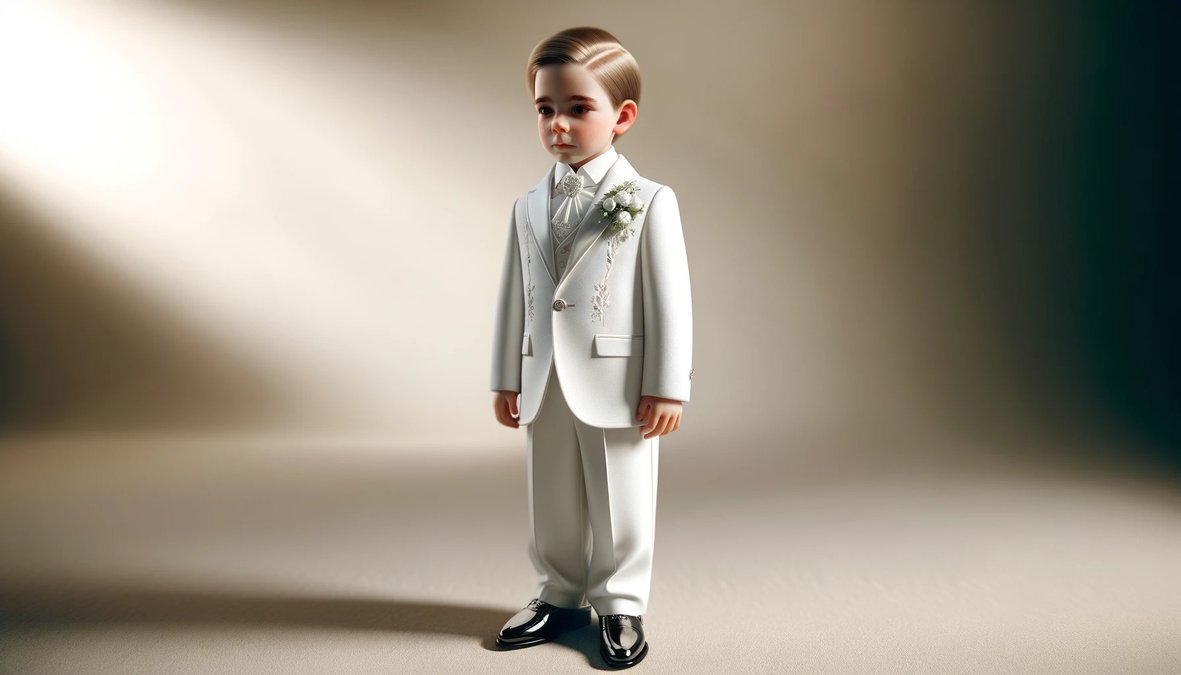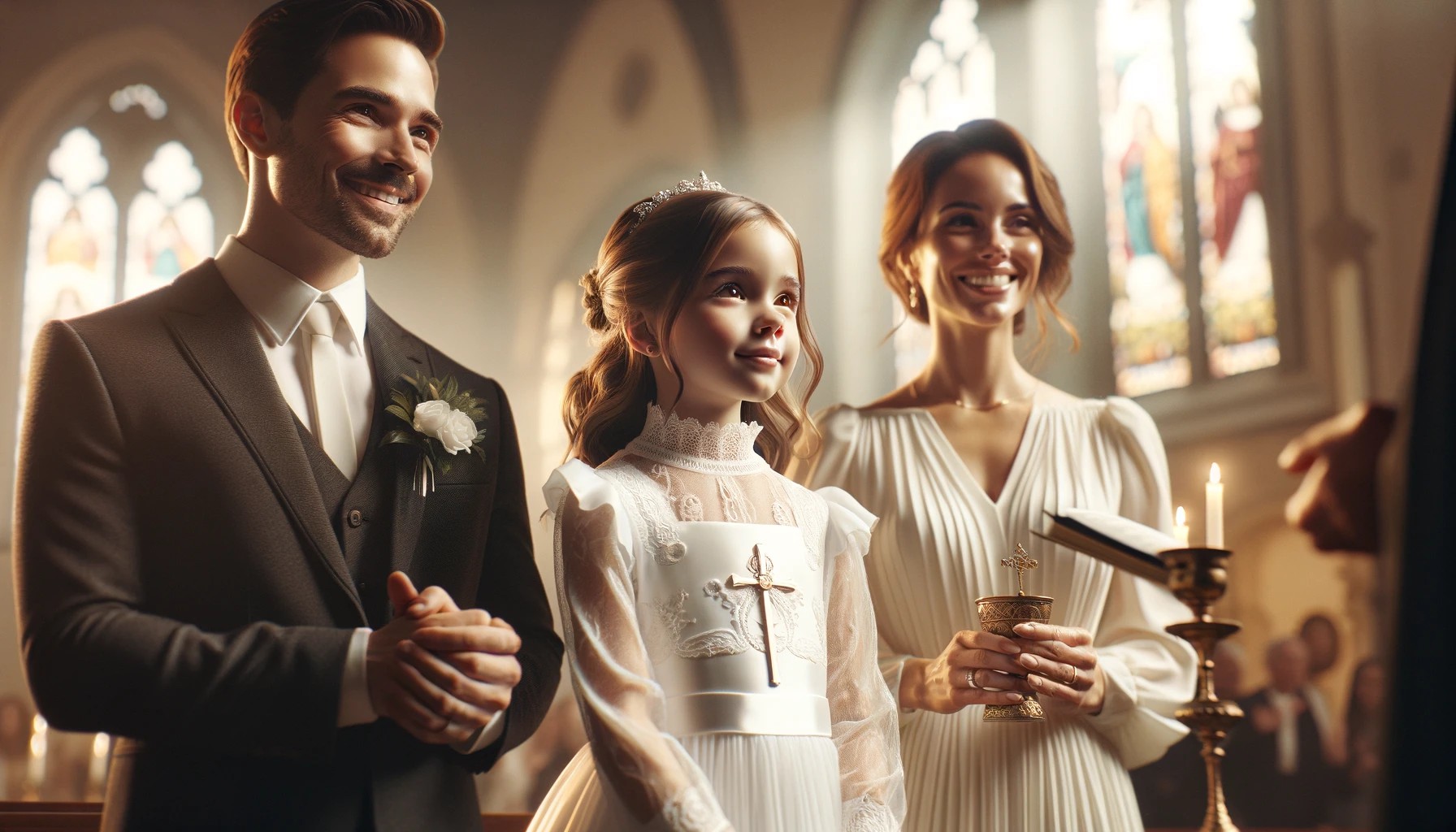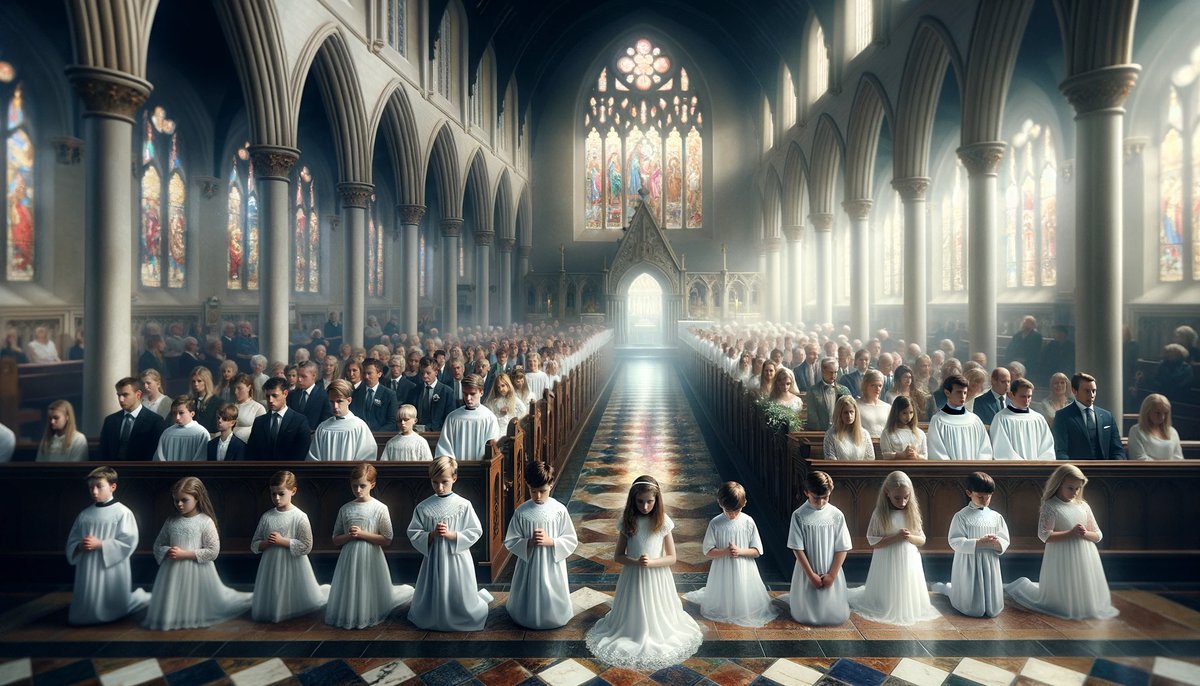Home>Theology and Spirituality>How To Prepare For First Holy Communion


Theology and Spirituality
How To Prepare For First Holy Communion
Published: February 25, 2024
Jason DeRose, Managing Editor at Christian.net, uses his expertise in religion and journalism to deepen understanding of faith's societal impacts. His editorial leadership, coupled with a strong academic background, enriches the platform’s diverse content, earning him recognition in both journalism and religious circles.
Prepare your child for their First Holy Communion with our comprehensive guide. Find tips, traditions, and meaningful ways to celebrate this important milestone in their theology and spirituality journey.
(Many of the links in this article redirect to a specific reviewed product. Your purchase of these products through affiliate links helps to generate commission for Christian.net, at no extra cost. Learn more)
Table of Contents
- Introduction
- Understanding the significance of First Holy Communion
- Preparing spiritually for First Holy Communion
- Attending First Holy Communion classes
- Choosing the right attire for First Holy Communion
- Participating in the First Holy Communion ceremony
- Celebrating First Holy Communion with family and friends
- Conclusion
Introduction
First Holy Communion is a momentous occasion in the life of a young Christian. It marks the first time a child receives the Eucharist, the body and blood of Jesus Christ, during a solemn and sacred ceremony. This significant milestone is often celebrated with great joy and reverence within the Christian community. The preparation for First Holy Communion involves not only practical considerations but also spiritual readiness and understanding of the sacrament's profound significance.
In this comprehensive guide, we will explore the various aspects of preparing for First Holy Communion, from the spiritual and educational preparations to the ceremonial and celebratory elements. Whether you are a parent, guardian, or a young individual embarking on this sacred journey, this guide aims to provide valuable insights and practical tips to ensure a meaningful and memorable First Holy Communion experience.
As we delve into the significance of First Holy Communion and the steps involved in its preparation, it is essential to approach this milestone with reverence, gratitude, and a deep sense of spiritual significance. Let us embark on this enlightening journey, embracing the sacred traditions and the profound spiritual meaning that underpin the First Holy Communion experience.
Read more: How To Wish For First Holy Communion
Understanding the significance of First Holy Communion
First Holy Communion holds profound significance in the Christian faith, symbolizing a pivotal moment in a child's spiritual journey. At its core, this sacrament represents the reception of the Eucharist, the body and blood of Jesus Christ, by individuals who have reached the age of reason and understanding. This sacred event is deeply rooted in the teachings of Jesus Christ, particularly the Last Supper, where He instituted the Eucharist as a means of spiritual nourishment and communion with Him.
For young Christians, First Holy Communion signifies their initiation into the central sacrament of the Catholic Church and other Christian denominations that observe this tradition. It marks a crucial step in their faith formation, signifying their readiness to partake in the divine mystery of the Eucharist. Through this sacrament, participants are believed to receive the grace and blessings of Christ, fostering a deeper connection to their faith and the wider Christian community.
Moreover, First Holy Communion serves as a profound reminder of Jesus' sacrificial love and the redemptive power of His crucifixion and resurrection. By partaking in the Eucharist, individuals symbolically unite with Christ, strengthening their spiritual bond with Him and embracing the promise of eternal life. This act of receiving the body and blood of Christ is a tangible expression of faith, underscoring the belief in His real presence in the consecrated elements of bread and wine.
Beyond its spiritual significance, First Holy Communion also holds immense cultural and familial importance. It is a cherished rite of passage, often accompanied by familial traditions, such as the selection of special attire, family gatherings, and the exchange of meaningful gifts. The memories created during this sacred occasion often endure as cherished milestones in a young person's life, fostering a sense of belonging within their faith community and family.
In essence, the significance of First Holy Communion extends far beyond a mere ceremonial event. It embodies the spiritual awakening and maturation of young Christians, inviting them to partake in the profound mystery of the Eucharist and embrace the transformative love of Christ. As we delve deeper into the preparations for this momentous occasion, it is essential to recognize and honor the profound significance that underpins the sacred tradition of First Holy Communion.
Preparing spiritually for First Holy Communion
Preparing for First Holy Communion involves not only the practical aspects of the ceremony but also the spiritual readiness of the young participants. It is a time of profound significance, as children are encouraged to deepen their understanding of the Eucharist and cultivate a meaningful connection to their faith. Spiritual preparation for First Holy Communion encompasses several essential elements:
Embracing the Sacrament's Meaning
Central to spiritual preparation is nurturing a genuine understanding of the Eucharist's significance. Children are guided to comprehend the sacred nature of receiving the body and blood of Christ, recognizing it as a profound act of communion with Jesus. Through age-appropriate teachings and discussions, they learn about the Last Supper, where Jesus instituted the Eucharist, and the transformative power of this sacrament in their spiritual lives.
Prayer and Reflection
Engaging in prayer and reflection forms a vital part of spiritual preparation. Children are encouraged to develop a habit of prayer, fostering a personal relationship with God and expressing gratitude for the gift of the Eucharist. Through guided prayers and moments of quiet reflection, they can contemplate the spiritual significance of receiving the body and blood of Christ, preparing their hearts to embrace this sacred experience.
Reconciliation and Forgiveness
In preparation for First Holy Communion, children are guided to participate in the sacrament of reconciliation, also known as confession. This sacramental practice allows them to seek forgiveness for their shortcomings and reconcile with God, paving the way for a renewed spiritual journey. By experiencing the grace of reconciliation, they are encouraged to approach the Eucharist with hearts cleansed of sin, ready to receive the blessings of Christ with humility and reverence.
Understanding the Mass
A fundamental aspect of spiritual preparation involves familiarizing children with the structure and significance of the Mass. They learn about the liturgical elements, the role of the priest, and the sacred rituals that culminate in the reception of the Eucharist. Understanding the Mass enables them to actively participate in the ceremony, fostering a deeper sense of reverence and awe for the sacred mysteries unfolding before them.
Cultivating Virtues
Spiritual preparation for First Holy Communion also emphasizes the cultivation of virtues such as kindness, compassion, and humility. Children are encouraged to embody the teachings of Jesus, reflecting His love and selflessness in their daily lives. By nurturing these virtues, they prepare themselves to approach the Eucharist with hearts attuned to the spirit of Christ, embracing the transformative power of His presence in the sacrament.
In essence, spiritual preparation for First Holy Communion is a journey of nurturing faith, understanding, and reverence. It lays the foundation for a lifelong relationship with the Eucharist, empowering children to embrace the spiritual richness of this sacrament and embark on a profound journey of communion with Christ.
Attending First Holy Communion classes
Attending First Holy Communion classes is a pivotal aspect of the preparation process, providing children with essential knowledge, spiritual guidance, and a deeper understanding of the sacrament. These classes serve as a platform for young participants to engage in meaningful learning experiences, fostering a sense of spiritual readiness and reverence as they approach this sacred milestone.
Read more: How To Take The Holy Communion
Comprehensive Religious Education
First Holy Communion classes offer a comprehensive religious education tailored to the understanding and developmental stage of the children. Through engaging lessons, interactive activities, and age-appropriate materials, participants delve into the fundamental teachings of the Eucharist, the significance of the sacrament, and its place within the broader context of Christian faith. These classes aim to instill a deep appreciation for the spiritual richness of the Eucharist, nurturing a sense of awe and reverence for this sacred tradition.
Sacramental Preparation
In addition to imparting knowledge, First Holy Communion classes focus on sacramental preparation, guiding children through the practical aspects of receiving the Eucharist. Participants learn about the rituals and customs associated with the First Holy Communion ceremony, gaining insight into the proper decorum, gestures, and prayers observed during the Mass. This preparation ensures that children approach the sacrament with a sense of solemnity and understanding, fully embracing the significance of this transformative experience.
Spiritual Formation
Central to the classes is the emphasis on spiritual formation, nurturing the inner disposition of the children as they prepare to receive the Eucharist. Through guided discussions, reflections, and spiritual exercises, participants are encouraged to deepen their connection to God, cultivate a spirit of reverence, and develop a personal relationship with Jesus Christ. The classes provide a nurturing environment for children to explore their faith, ask meaningful questions, and embark on a journey of spiritual growth in anticipation of their First Holy Communion.
Community Engagement
First Holy Communion classes also foster a sense of community engagement, allowing children to connect with their peers who are similarly preparing for this sacred sacrament. This communal aspect provides a supportive and enriching environment where participants can share their experiences, learn from one another, and form lasting bonds within their faith community. The sense of camaraderie and shared purpose enhances the overall preparation process, creating a sense of belonging and unity among the young participants.
Read more: How To Wish Holy Communion
Family Involvement
Furthermore, these classes often extend their reach to involve families in the preparation for First Holy Communion. Parents and guardians are invited to participate in informational sessions, workshops, and family-centered activities that complement the children's learning. This inclusive approach not only strengthens familial bonds but also reinforces the significance of First Holy Communion as a cherished milestone celebrated within the context of family and faith.
In essence, attending First Holy Communion classes is a transformative and enriching experience that goes beyond mere instruction. It serves as a nurturing ground for spiritual growth, communal bonding, and the holistic preparation of children as they embark on this sacred journey of faith and communion with Christ.
Choosing the right attire for First Holy Communion
Selecting the appropriate attire for First Holy Communion is a cherished tradition that holds deep symbolic significance. The attire worn during this sacred ceremony reflects the solemnity and reverence of the occasion, embodying the spiritual purity and devotion of the young participants. From traditional white garments to tasteful accessories, the choice of attire for First Holy Communion is a meaningful aspect of the preparation process.
Traditional White Garments
The predominant tradition for First Holy Communion attire is the selection of white garments, symbolizing purity, innocence, and the radiant joy of this spiritual milestone. For girls, a white dress or gown, often adorned with delicate lace, embroidery, or subtle embellishments, embodies the timeless elegance and grace befitting the occasion. The simplicity and purity of white attire evoke a sense of reverence and spiritual readiness as the young girls prepare to receive the Eucharist for the first time.
Dapper Suits for Boys
Boys traditionally don dapper suits in shades of white, ivory, or light pastel colors, exuding a sense of refinement and reverence. A well-tailored suit, complemented by a crisp white shirt and a coordinating tie, reflects the significance of the occasion and the young boys' transition into a deeper understanding of their faith. The classic and dignified appearance of the attire underscores the solemnity of the ceremony and the spiritual maturity of the participants.
Read more: How To Minister Holy Communion
Veils and Headpieces
For girls, the addition of veils or delicate headpieces holds special significance, symbolizing modesty and reverence as they approach the Eucharist. Veils, often crafted from fine lace or tulle, lend an ethereal and angelic quality to the attire, accentuating the girls' sense of spiritual purity and devotion. These adornments serve as a visual representation of the sacred nature of the First Holy Communion ceremony, adding a touch of grace and reverence to the girls' ensembles.
Meaningful Accessories
In addition to the main attire, meaningful accessories such as rosary beads, cross pendants, or religious bracelets are often incorporated into the ensemble, serving as poignant reminders of the spiritual significance of the occasion. These accessories not only complement the attire but also carry profound symbolic value, underscoring the participants' commitment to their faith and their reverence for the sacrament of the Eucharist.
Family Heirlooms and Traditions
Many families embrace the tradition of incorporating heirloom jewelry, such as a grandmother's pearl necklace or a treasured family cross, into the First Holy Communion attire. These cherished heirlooms carry a legacy of faith and love, infusing the ceremony with a sense of continuity and familial connection. By integrating these meaningful elements, families honor their heritage and impart a sense of spiritual legacy to the young participants.
In essence, choosing the right attire for First Holy Communion is a deeply symbolic and cherished aspect of the preparation process. The attire serves as a visual representation of the participants' spiritual readiness, purity, and reverence as they embark on this sacred journey of faith and communion with Christ. It is a reflection of the timeless traditions and the profound significance of this milestone within the Christian faith community.
Participating in the First Holy Communion ceremony
Participating in the First Holy Communion ceremony is the culmination of a profound spiritual journey for young Christians. This sacred event, often held within the hallowed walls of a church, represents the pivotal moment when children receive the Eucharist for the first time, symbolizing their initiation into the central sacrament of the Christian faith. The ceremony itself is imbued with rich traditions, solemn rituals, and a sense of reverent anticipation, creating an atmosphere of spiritual significance and communal celebration.
As the participants gather with their families and fellow communicants, the church becomes a sacred space where the divine and the earthly converge. The ceremony typically unfolds within the context of a traditional Mass, with the young communicants playing a central role in the liturgical proceedings. Dressed in their pristine white attire, the boys and girls approach the altar with a blend of awe and excitement, ready to partake in the transformative act of receiving the body and blood of Christ.
The First Holy Communion ceremony is characterized by a series of poignant rituals and gestures, each laden with profound symbolism. The participants, guided by the clergy, engage in prayers, hymns, and readings that underscore the spiritual significance of the Eucharist. As the moment of communion approaches, a sense of solemnity descends upon the congregation, heightening the anticipation and reverence for the sacred act about to unfold.
The reception of the Eucharist itself is a deeply moving and transformative experience. With hands clasped in prayer and hearts open to the presence of Christ, the young communicants approach the altar to receive the consecrated host, the body of Christ, and partake in the chalice containing the precious blood of Christ. This act of communion represents a profound union with Jesus, a moment of spiritual nourishment and grace that resonates deeply within the hearts of the participants.
Amidst the hushed reverence of the congregation, the First Holy Communion ceremony culminates in a profound sense of spiritual fulfillment and communal joy. Families and friends bear witness to this sacred moment, offering their unwavering support and love to the young communicants as they embrace the transformative power of the Eucharist. The ceremony serves as a testament to the participants' spiritual growth, their readiness to partake in the mysteries of the faith, and their deepening connection to the Christian community.
In essence, participating in the First Holy Communion ceremony is a deeply meaningful and sacred experience, marking a significant milestone in the spiritual journey of young Christians. It is a moment of profound communion with Christ, a celebration of faith, and a testament to the enduring traditions and spiritual richness of the Christian faith community.
Celebrating First Holy Communion with family and friends
The celebration of First Holy Communion extends beyond the sacred ceremony itself, encompassing joyous gatherings, cherished traditions, and heartfelt expressions of love and support from family and friends. This momentous occasion serves as a unifying force, bringing together loved ones to honor the spiritual journey of the young communicants and to rejoice in the profound significance of the Eucharist.
Following the solemnity of the First Holy Communion ceremony, families often organize celebratory gatherings to mark this sacred milestone. These gatherings serve as a testament to the communal joy and spiritual unity that permeate the occasion. Whether it is a festive luncheon, a joy-filled reception, or a heartfelt family dinner, the celebration of First Holy Communion becomes an opportunity for families and friends to come together in a spirit of gratitude and reverence.
The atmosphere of these celebrations is imbued with warmth, love, and a sense of shared faith. Family members and friends gather to offer their heartfelt congratulations to the young communicants, expressing pride in their spiritual commitment and embracing the significance of this transformative moment. It is a time for laughter, shared memories, and the creation of lasting bonds within the faith community.
The act of celebrating First Holy Communion with family and friends also extends beyond the immediate day of the ceremony. It often involves the exchange of meaningful gifts, symbolic gestures, and cherished traditions that further enrich the experience. From religious mementos and keepsakes that symbolize the enduring nature of faith to heartfelt tokens of love and support, the exchange of gifts becomes a poignant expression of the spiritual significance of the occasion.
Moreover, the celebration of First Holy Communion serves as a testament to the enduring traditions and cultural customs that enrich the fabric of the Christian faith community. Families often incorporate time-honored rituals, such as the sharing of a special meal, the presentation of commemorative items, or the offering of blessings, into the celebration. These traditions not only honor the sacred nature of the occasion but also foster a sense of continuity and spiritual legacy within the family and the wider community.
In essence, celebrating First Holy Communion with family and friends is a deeply meaningful and joyous experience, characterized by love, unity, and the enduring bonds of faith. It is a time for families to come together in celebration of the young communicants' spiritual growth, to express their unwavering support, and to embrace the timeless traditions that underscore the profound significance of the Eucharist within the Christian faith.
Conclusion
The journey towards First Holy Communion is a profound and transformative experience, encompassing spiritual preparation, educational guidance, and the joyous celebration of faith within the Christian community. As young participants embark on this sacred milestone, they are enveloped in a tapestry of traditions, reverence, and familial love, marking a significant step in their spiritual growth and connection to the Eucharist.
The significance of First Holy Communion extends far beyond the ceremonial event itself. It represents a pivotal moment in the lives of young Christians, symbolizing their initiation into the central sacrament of the Christian faith. The spiritual preparation that precedes this milestone is a journey of deepening understanding, prayerful reflection, and the cultivation of virtues, fostering a profound connection to the Eucharist and the teachings of Jesus Christ.
Attending First Holy Communion classes serves as a nurturing ground for spiritual growth and communal bonding, providing children with essential knowledge, sacramental preparation, and a deeper understanding of the significance of the Eucharist. These classes not only impart religious education but also foster a sense of reverence, unity, and familial involvement, enriching the preparation process.
The choice of attire for First Holy Communion is a cherished tradition that holds deep symbolic significance, reflecting the spiritual purity, reverence, and devotion of the young participants. From traditional white garments to meaningful accessories, the attire serves as a visual representation of the participants' spiritual readiness and their embrace of this sacred journey of faith and communion with Christ.
Participating in the First Holy Communion ceremony is a deeply meaningful and sacred experience, marking a significant milestone in the spiritual journey of young Christians. It is a moment of profound communion with Christ, a celebration of faith, and a testament to the enduring traditions and spiritual richness of the Christian faith community.
The celebration of First Holy Communion with family and friends becomes an opportunity for loved ones to come together in a spirit of gratitude and reverence, expressing pride in the spiritual commitment of the young communicants and embracing the significance of this transformative moment. It is a time for laughter, shared memories, and the creation of lasting bonds within the faith community.
In essence, First Holy Communion represents a sacred bridge between the innocence of childhood and the deepening of spiritual understanding, fostering a sense of belonging within the Christian community and a lifelong connection to the transformative love of Christ. As young hearts are nourished by the Eucharist for the first time, they embark on a journey of faith, unity, and enduring grace, carrying the blessings of this sacred sacrament throughout their lives.










